
Despite largely working behind the scenes, bookkeepers have long played a crucial part in the success of small businesses across the country. This year, however, they’ve become their clients’ first line of support. Often operating at all hours to come to the aid of struggling small businesses, throughout the pandemic they’ve been called on to provide constant financial and emotional guidance. And they’ve delivered on both counts.
As Xero’s Head of Community, our community team has watched in awe as our bookies have tirelessly and graciously helped clients with everything from unpacking the latest in government aid (often at lightning speed) to simply helping them stay afloat. Needless to say, the pressure has been relentless. So, as we celebrate Global Bookkeeping Week, the team at Xero is coming together to #RaiseACup to the far too often unsung heroes behind Australia’s small businesses.
In honour of bookkeepers and their integral role together with accountants in keeping our economy moving, we sat down with Michele Grisdale of Rainforest Bookkeeping and Ryan Gollan of CFM Bookkeeping to talk about harnessing future talent, learnings from 2020, and whether the profession is in need of a new name.
How do you think the industry should be working to encourage and empower the next generation of talent?
Michele: We need to teach the bookkeepers of the future how to genuinely communicate with small business owners. Not just on a financial level, but in a way that ensures they understand every aspect of how to make running a business as smooth as possible.
I’m also a huge advocate of mentorship. So many bookkeepers start out working for friends or family, but this isn’t always the best fit or the most conducive to growth. Instead, I feel we should be arranging large-scale mentoring programs that allow new starters to uncover the industries they feel most suited to advising.
Ryan: More than anything, we need to place the human element of bookkeeping front and centre and capture the difference that we stand to make in people’s lives. The sooner that bookkeeping isn’t presented to the new generation of talent as just a glorified data entry job the better because that’s where progress begins.
2020 certainly hasn’t been short on learnings – what’s one thing you’ve learned this year that you’ll apply to your practice moving forward?
Michele: If your processes don’t work now, they’ll never work – especially in this period of uncertainty. This year, I’ve been reminded that it’s a matter of constantly upgrading your processes, engaging in training and doing your best to stay ahead (after all, who knows where we’ll end up next). I’ve always been organised, but I’ve become turbo-charged.
Ryan: It’s been such a challenging but also rewarding year, and I’ve learned so many things. It’s impossible to put it down to just one take away, but as a team we’ve become so much more resourceful.
We’ve come to understand that collaboration benefits everyone. This has played out in the relationships we’ve formed throughout the year – we even brought a group of accountants and bookkeepers from different firms together to create a JobKeeper mastermind team. We benefited, our clients benefited, and it was a completely invaluable experience.
Lastly, how do you feel about the term ‘bookkeeper’? Do you think it’s time that it evolved?
Michele: One hundred percent. As there are no qualifications required to become a bookkeeper, the title doesn’t represent the huge amount of work and time that the majority of us put into progressing our careers. What we do in this profession is about so much more than just ‘looking after the books’ – the pandemic has made that clearer than ever. For this reason, I’ve found a new term that I feel truly reflects what I do every day: I’m a financial advocate for businesses.
Ryan: It’s not so much the word I have an issue with, but the perception of what we do. I know the value that our role holds, but outsiders often consider our contribution as basic and that couldn’t be further from the truth – especially considering everything that we’ve taken on this year. Ultimately, if we need to do away with the term ‘bookkeeper’ to change the perception then I’d be happy to do so.
Leave a Reply